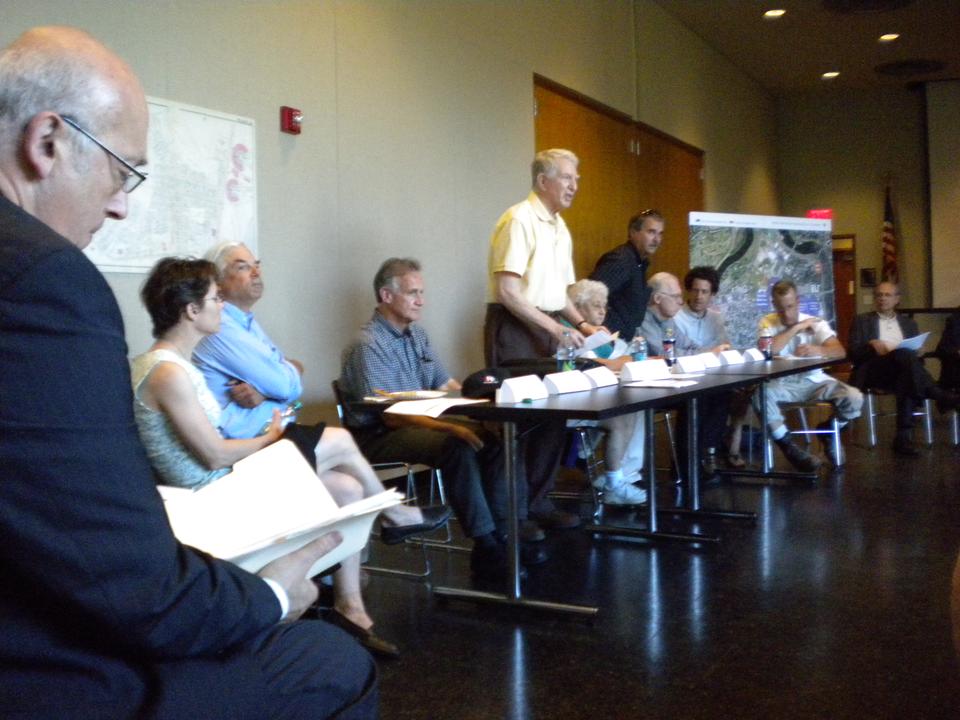
News
Cambridge Residents Slam Council Proposal to Delay Bike Lane Construction

News
‘Gender-Affirming Slay Fest’: Harvard College QSA Hosts Annual Queer Prom

News
‘Not Being Nerds’: Harvard Students Dance to Tinashe at Yardfest

News
Wrongful Death Trial Against CAMHS Employee Over 2015 Student Suicide To Begin Tuesday

News
Cornel West, Harvard Affiliates Call for University to Divest from ‘Israeli Apartheid’ at Rally
Allston Remains at Odds with Harvard Over Development
Highly awaited development recommendations appear to have failed in appeasing community's concerns

After an hour and a half of tense exchange Monday between Allston residents and Harvard representatives about the recent list of recommendations for the University’s plans for the Allston development, one outside observer interjected with a comment that brought the heated dialogue to a halt.
“This isn’t even about planning,” said former Boston City Councillor Bruce C. Bolling, who is neither an Allston resident nor a Harvard affiliate. “You have a fractured relationship.”
Addressing the disgruntled parties, he added, “You cannot go forward until you address this fractured relationship. Allston and Harvard have to go forward as one.”
A round of applause rang out at the meeting between the Harvard Allston Task Force and the Allston Work Team after Bolling’s remark.
About 60 people attended the meeting Monday night to discuss the recommendations for Allston that the Work Team announced almost two weeks ago.
The five-part plan includes developing the halted science complex into a life science center, creating an enterprise research campus, establishing housing for faculty and graduate students, planning for more academic space for the existing Charlesview site, and exploring the possibility of building a conference center and hotel.
Alex Krieger, one of the co-chairs of the Work Team and a Design School professor, illustrated the five recommendations by identifying each as a message to Harvard from the community.
Some of the messages included "Harvard, finish what you began" as the thinking behind the development of the science complex, and "Harvard, don't delay—start thinking very seriously about Barry's Corner" as part of the reason for planning to establish housing for faculty and graduate students there.
More than 10 members of the Task Force sat in a panel-like fashion at the front of the room, facing the handful of representatives from Harvard.
Several Allston residents took turns attacking the process that was used to arrive at the recommendations.
In response to the recommendation regarding expanding academic space—"Guess what, the future academic needs of Harvard will be handled in this triangle"—Brent Whelan ’73, a Task Force member who spoke several times during the meeting, said that they had been expecting museums and cultural space in that area.
Whelan said that the recommendation to "enable academic growth by preserving land adjacent to existing campus" was not specific enough and could mean decades of staring at an empty space before Harvard decided what to do with it.
“I’m pretty distressed that the planning is going on with a narrow focus,” Whelan said, asking the representatives from Harvard why the community was not consulted in making the recommendations. “If that’s what Harvard’s going to do, then just tell us, so we can stop coming to meetings.”
Task Force member Bruce E. Houghton called the Work Team representatives present at the meeting the “new kids on the block," alluding to the short amount of time that Co-Chairs Bill Purcell and Krieger and Associate Vice President for Public Affairs and Communications Kevin Casey had been involved in the Allston planning process compared to the Allston residents who have lived there for decades.
But Casey remained calm in responding to the concerns of the Allston residents. He said that the Work Team would find a method to have a conversation about the integration that the residents were seeking.
The feedback from the meeting would be relayed to an internal review group, Casey said.
—Staff writer Xi Yu can be reached at xyu@college.harvard.edu.
Want to keep up with breaking news? Subscribe to our email newsletter.
